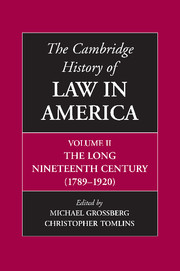Book contents
- Frontmatter
- 1 Law and the American State, from the Revolution to the Civil War: Institutional Growth and Structural Change
- 2 Legal Education and Legal Thought, 1790–1920
- 3 The Legal Profession: From the Revolution to the Civil War
- 4 The Courts, 1790–1920
- 5 Criminal Justice in the United States, 1790–1920: A Government of Laws or Men?
- 6 Citizenship And Immigration Law, 1800–1924: Resolutions Of Membership And Territory
- 7 Federal Policy, Western Movement, and Consequences for Indigenous People, 1790–1920
- 8 Marriage and Domestic Relations
- 9 Slavery, Anti-Slavery, and the Coming of the Civil War
- 10 The Civil War And Reconstruction
- 11 Law, Personhood, and Citizenship in the Long Nineteenth Century: the Borders of Belonging
- 12 Law in Popular Culture, 1790–1920: The People and the Law
- 13 Law and Religion, 1790–1920
- 14 Legal Innovation and Market Capitalism, 1790–1920
- 15 Innovations in Law and Technology, 1790–1920
- 16 The Laws of Industrial Organization, 1870–1920
- 17 The Military in American Legal History
- 18 The United States and International Affairs, 1789–1919
- 19 Politics, State-Building, and the Courts, 1870–1920
- Bibliographic Essays
- Notes on Contributors
- Index
- References
7 - Federal Policy, Western Movement, and Consequences for Indigenous People, 1790–1920
Published online by Cambridge University Press: 28 November 2008
- Frontmatter
- 1 Law and the American State, from the Revolution to the Civil War: Institutional Growth and Structural Change
- 2 Legal Education and Legal Thought, 1790–1920
- 3 The Legal Profession: From the Revolution to the Civil War
- 4 The Courts, 1790–1920
- 5 Criminal Justice in the United States, 1790–1920: A Government of Laws or Men?
- 6 Citizenship And Immigration Law, 1800–1924: Resolutions Of Membership And Territory
- 7 Federal Policy, Western Movement, and Consequences for Indigenous People, 1790–1920
- 8 Marriage and Domestic Relations
- 9 Slavery, Anti-Slavery, and the Coming of the Civil War
- 10 The Civil War And Reconstruction
- 11 Law, Personhood, and Citizenship in the Long Nineteenth Century: the Borders of Belonging
- 12 Law in Popular Culture, 1790–1920: The People and the Law
- 13 Law and Religion, 1790–1920
- 14 Legal Innovation and Market Capitalism, 1790–1920
- 15 Innovations in Law and Technology, 1790–1920
- 16 The Laws of Industrial Organization, 1870–1920
- 17 The Military in American Legal History
- 18 The United States and International Affairs, 1789–1919
- 19 Politics, State-Building, and the Courts, 1870–1920
- Bibliographic Essays
- Notes on Contributors
- Index
- References
Summary
In virtually every respect imaginable — economic, political, cultural, sociological, psychological, geographical, and technological — the years from the creation of the United States through the Harding administration brought massive upheaval and transformation for native nations. Everywhere, U.S. Indian law (federal and state) — by which I mean the law that defines and regulates the nation’s political and legal relationship to indigenous nations — aided and abetted the upheaval.
The nature of U.S. Indian law is, of course, fundamentally different from the various indigenous legal and customary traditions that encompassed the social norms, values, customs, and religious views of native nations. These two fundamentally distinct legal cultures, and their diverse practitioners and purveyors, were thus frequently in conflict. Important moments of recognition, however, did take place, particularly the early treaty period (1600s—1800), and later, there were infrequent, spasms of U.S. judicial recognition. In Ex parte Crow Dog (1883) and Talton v. Mayes(1896), for example, the U.S. Supreme Court acknowledged the distinctive sovereign status of native nations by holding that the U.S. Constitution did not constrain the inherent rights of Indian nations because their sovereignty predated that of the United States. Perhaps the period of greatest European acceptance occurred during the encounter era when indigenous practices of law and peace, particularly among the tribal nations of the Northeast, served as a broad philosophical and cultural paradigm for intergovernmental relations between indigenous peoples and the various European and Euro-American diplomats and policymakers with whom they interacted. Whether tribal, based in indigenous custom and tradition, or Western, based in English common law custom and tradition, law speaks to the basic humanity of individuals and societies.
- Type
- Chapter
- Information
- The Cambridge History of Law in America , pp. 204 - 244Publisher: Cambridge University PressPrint publication year: 2008
References
- 1
- Cited by



